
twinny
The most no-nonsense, locally or API-hosted AI code completion plugin for Visual Studio Code - like GitHub Copilot but 100% free.
Stars: 3429
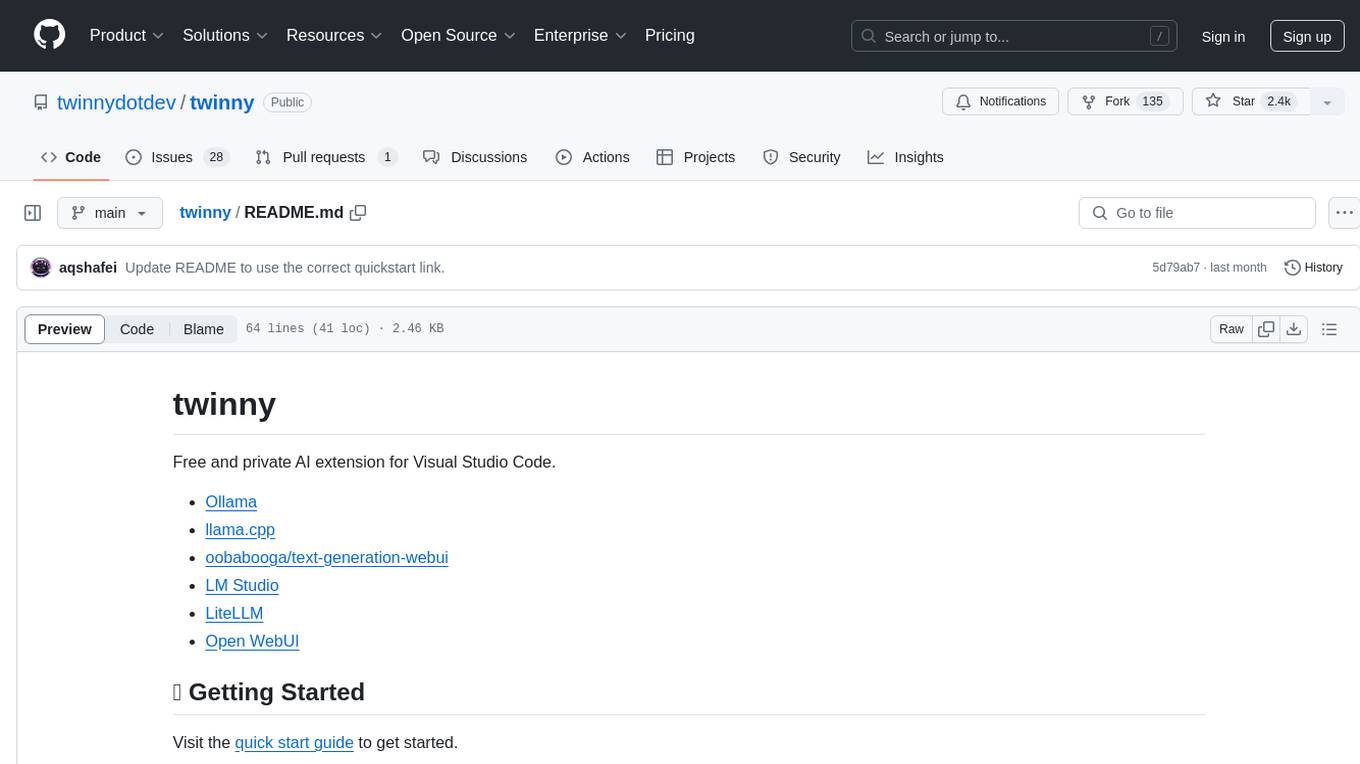
Twinny is a free and private AI extension for Visual Studio Code that offers AI-based code completion and code discussion features. It provides real-time code suggestions, function explanations, test generation, refactoring requests, and more. Twinny operates both online and offline, supports customizable API endpoints, conforms to OpenAI API standards, and offers various customization options for prompt templates, API providers, model names, and more. It is compatible with multiple APIs and allows users to accept code solutions directly in the editor, create new documents from code blocks, and copy generated code solution blocks. Twinny is open-source under the MIT license and welcomes contributions from the community.
README:
Twinny is a free AI extension for Visual Studio Code, offering powerful AI-assisted coding features.
- localhost OpenAI/Ollama Compatible API (default)
- OpenAI
- Anthropic
- OpenRouter
- Deepseek
- Cohere
- Mistral AI
- Perplexity
- Groq
For a quick start guide, visit our documentation.
Twinny provides AI-powered real-time code suggestions to enhance your coding experience.
Use the sidebar to discuss your code with AI, getting explanations, tests, refactoring suggestions, and more.
- Online and offline operation
- Customizable API endpoints
- Preserved chat conversations
- OpenAI API standard compliance
- Single and multiline fill-in-the-middle completions
- Customizable prompt templates
- Git commit message generation
- Easy installation via VS Code marketplace
- Configurable settings (API provider, model, port, path)
- Direct code solution acceptance
- New document creation from code blocks
- Side-by-side diff view
- Full-screen chat mode
- Code solution block copying
- Workspace embeddings for context-aware assistance
- Symmetry network integration for P2P AI inference
Twinny uses workspace embeddings to provide context-aware AI assistance, improving the relevance of suggestions.
A decentralized P2P network for sharing AI inference resources, enhancing the capabilities of Twinny.
For troubleshooting and known issues, please check our GitHub issues page.
We welcome contributions! Please contact us via Twitter, describe your proposed changes in an issue, and submit a pull request. Twinny is MIT licensed.
Twinny is free and open-source. If you'd like to support the project, donations are appreciated:
Bitcoin: 1PVavNkMmBmUz8nRYdnVXiTgXrAyaxfehj
For updates, follow us on Twitter: https://x.com/twinnydotdev
Twinny is actively developed and provided "as is". Functionality may vary between updates.
For Tasks:
Click tags to check more tools for each tasksFor Jobs:
Alternative AI tools for twinny
Similar Open Source Tools

twinny
Twinny is a free and private AI extension for Visual Studio Code that offers AI-based code completion and code discussion features. It provides real-time code suggestions, function explanations, test generation, refactoring requests, and more. Twinny operates both online and offline, supports customizable API endpoints, conforms to OpenAI API standards, and offers various customization options for prompt templates, API providers, model names, and more. It is compatible with multiple APIs and allows users to accept code solutions directly in the editor, create new documents from code blocks, and copy generated code solution blocks. Twinny is open-source under the MIT license and welcomes contributions from the community.

twinny
Twinny is a free and open-source AI code completion plugin for Visual Studio Code and compatible editors. It integrates with various tools and frameworks, including Ollama, llama.cpp, oobabooga/text-generation-webui, LM Studio, LiteLLM, and Open WebUI. Twinny offers features such as fill-in-the-middle code completion, chat with AI about your code, customizable API endpoints, and support for single or multiline fill-in-middle completions. It is easy to install via the Visual Studio Code extensions marketplace and provides a range of customization options. Twinny supports both online and offline operation and conforms to the OpenAI API standard.
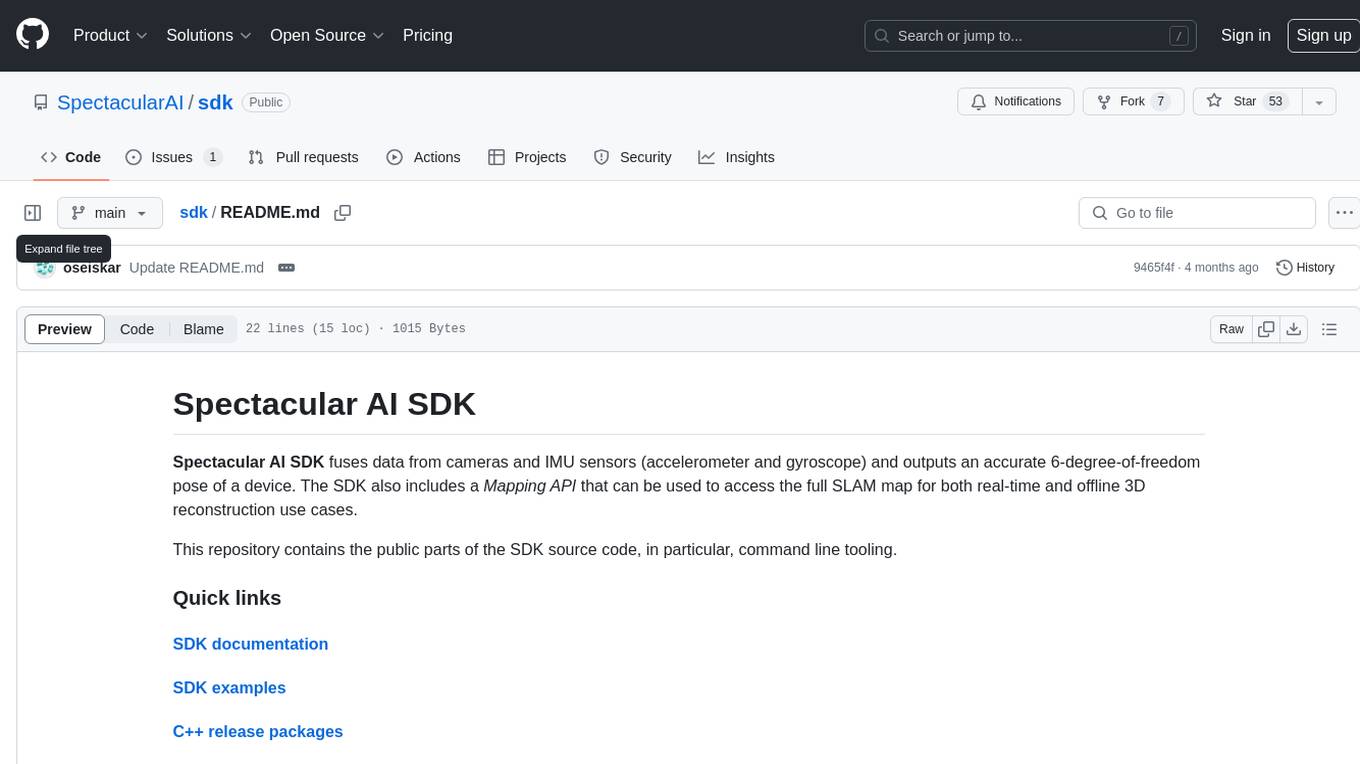
sdk
The SDK repository contains a software development kit that provides tools, libraries, and documentation for developers to build applications for a specific platform or framework. It includes code samples, APIs, and other resources to streamline the development process and enhance the functionality of the applications. Developers can use the SDK to access platform-specific features, integrate with external services, and optimize performance. The repository is regularly updated to ensure compatibility with the latest platform updates and industry standards, making it a valuable resource for developers looking to create high-quality applications efficiently.
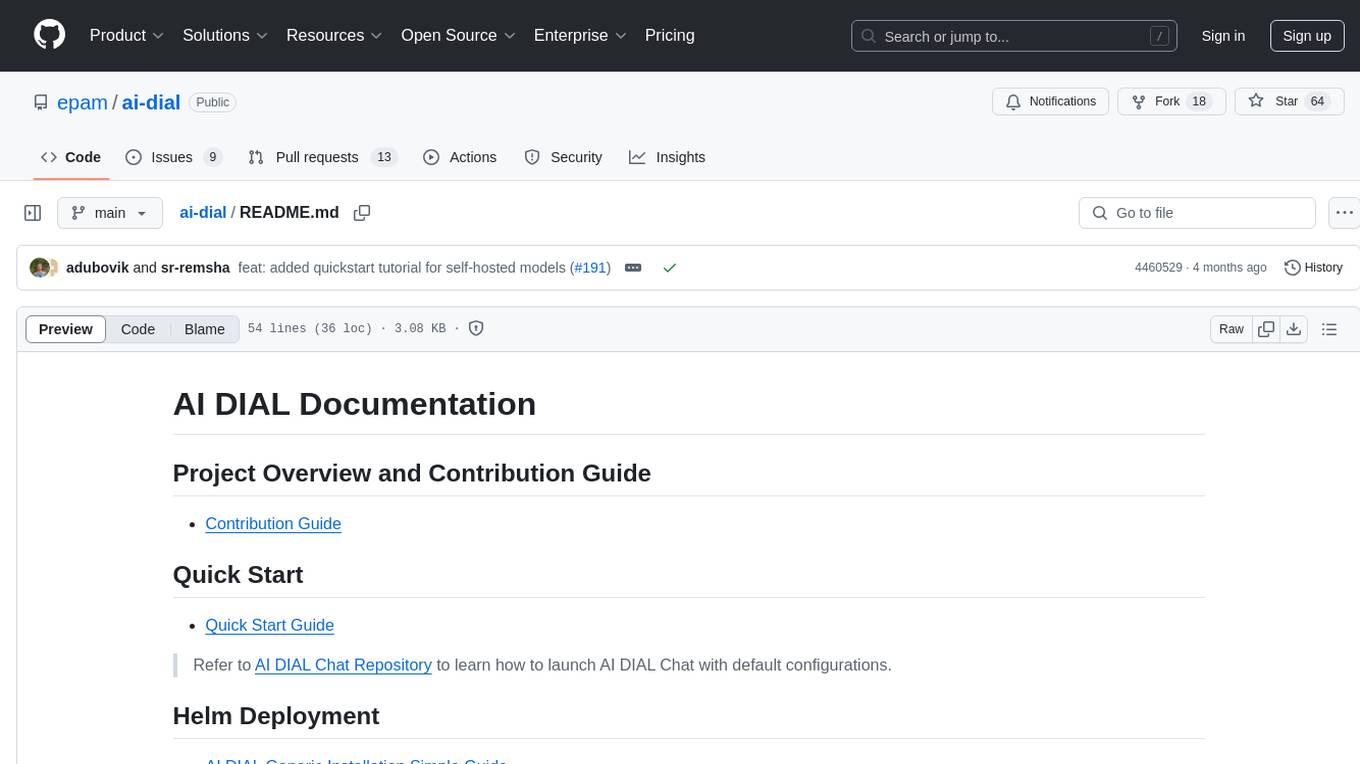
ai-dial
AI DIAL is an open-source project that provides a platform for developing and deploying conversational AI applications. It includes components such as DIAL Core for API exposure, DIAL SDK for development, and DIAL Chat for default UI. The project offers tutorials for launching AI DIAL Chat with different models and applications, along with a user manual and configuration guide. Additionally, there are various open-source repositories related to DIAL, including DIAL Helm for helm chart, DIAL Assistant for model agnostic assistant implementation, and DIAL Analytics Realtime for usage analytics. The project aims to simplify the development and deployment of AI-powered chat applications.
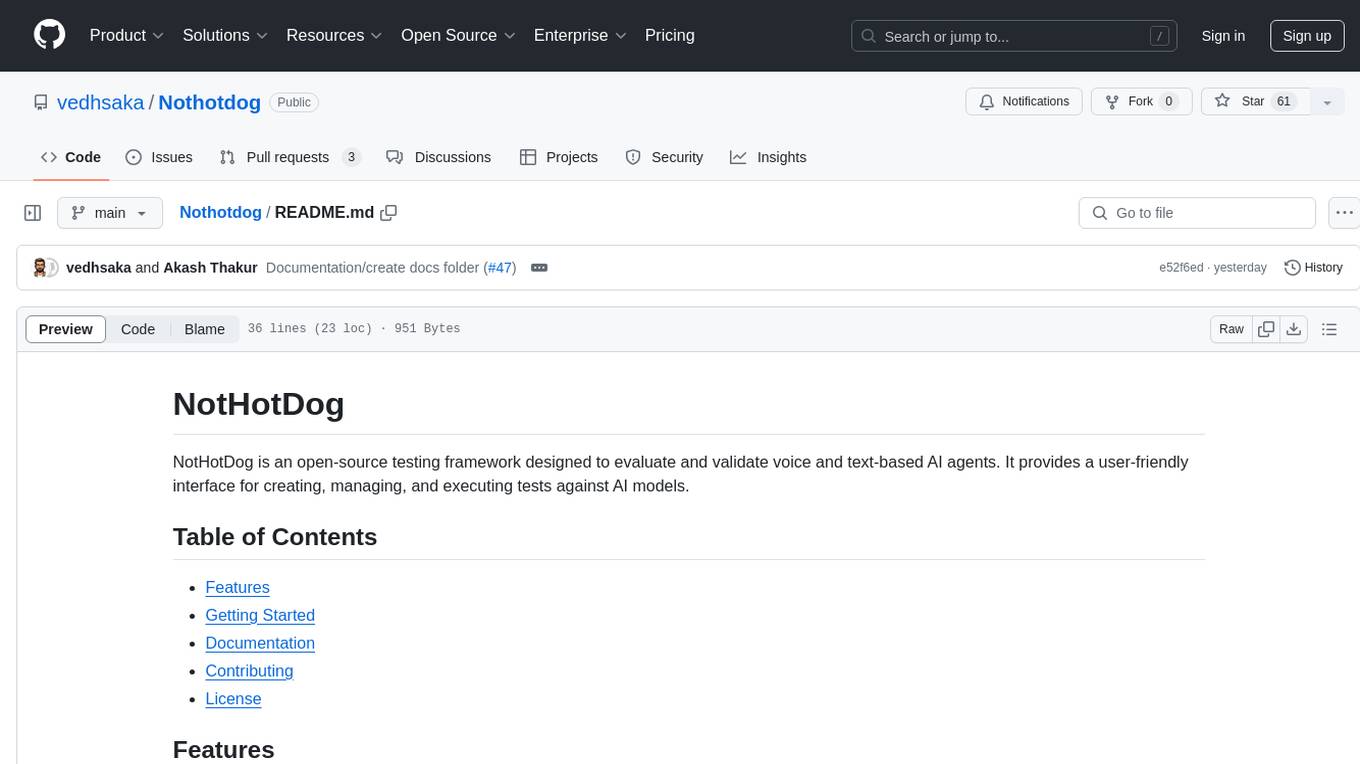
Nothotdog
NotHotDog is an open-source testing framework for evaluating and validating voice and text-based AI agents. It offers a user-friendly interface for creating, managing, and executing tests against AI models. The framework supports WebSocket and REST API, test case management, automated evaluation of responses, and provides a seamless experience for test creation and execution.
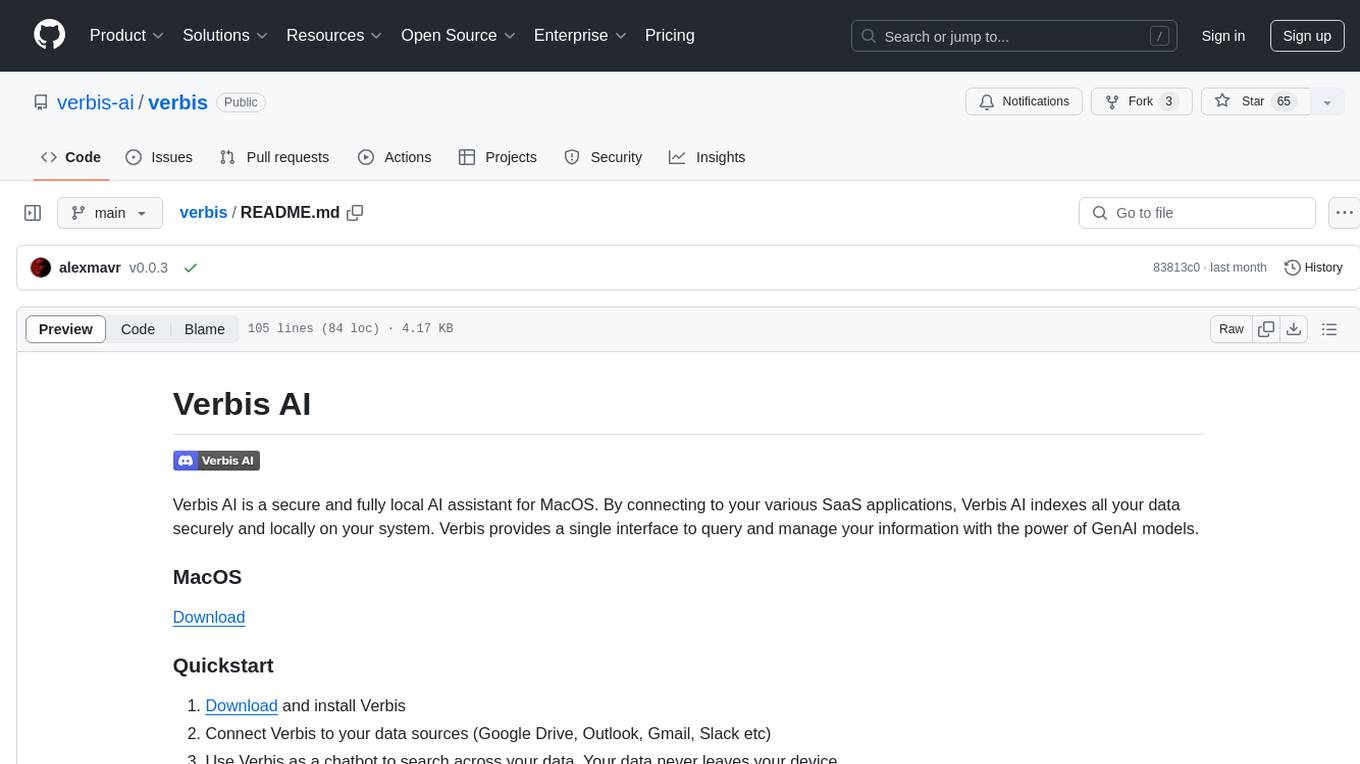
verbis
Verbis AI is a secure and fully local AI assistant for MacOS that indexes data from various SaaS applications securely on the user's system. It provides a single interface powered by GenAI models to query and manage information. Users can connect Verbis to apps like Google Drive, Outlook, Gmail, and Slack, and use it as a chatbot to search across their data without data leaving their device. The tool is powered by Ollama and Weaviate, utilizing models like Mistral 7B, ms-marco-MiniLM-L-12-v2, and nomic-embed-text. Verbis AI requires Apple Silicon Mac (m1+) and has minimal system resource utilization requirements.
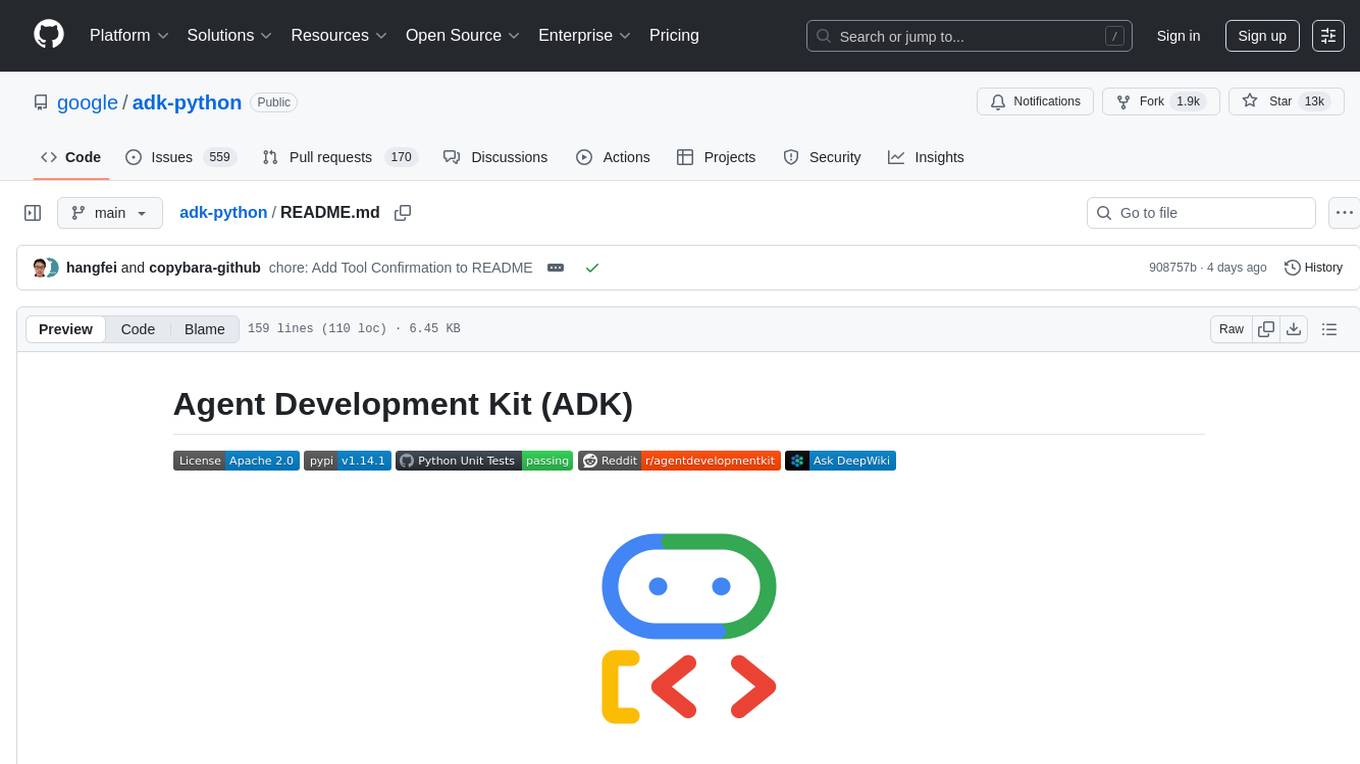
adk-python
Agent Development Kit (ADK) is an open-source, code-first Python toolkit for building, evaluating, and deploying sophisticated AI agents with flexibility and control. It is a flexible and modular framework optimized for Gemini and the Google ecosystem, but also compatible with other frameworks. ADK aims to make agent development feel more like software development, enabling developers to create, deploy, and orchestrate agentic architectures ranging from simple tasks to complex workflows.
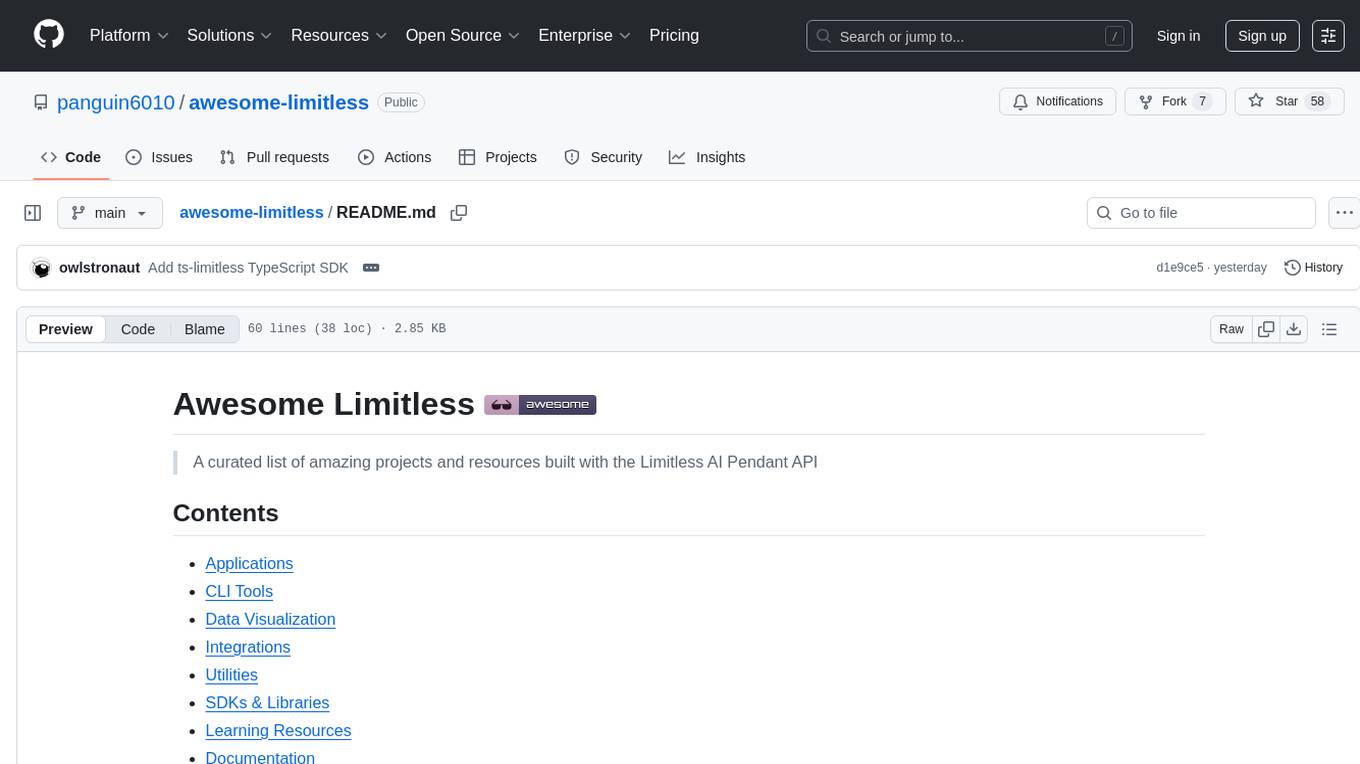
awesome-limitless
A curated list of amazing projects and resources built with the Limitless AI Pendant API. It includes applications, CLI tools, data visualization tools, integrations with plugins and extensions, utilities for server conversion and data ingestion, SDKs and libraries for Go and TypeScript, learning resources, and official API documentation.

coze-studio
Coze Studio is an all-in-one AI agent development tool that offers the most convenient AI agent development environment, from development to deployment. It provides core technologies for AI agent development, complete app templates, and build frameworks. Coze Studio aims to simplify creating, debugging, and deploying AI agents through visual design and build tools, enabling powerful AI app development and customized business logic. The tool is developed using Golang for the backend, React + TypeScript for the frontend, and follows microservices architecture based on domain-driven design principles.
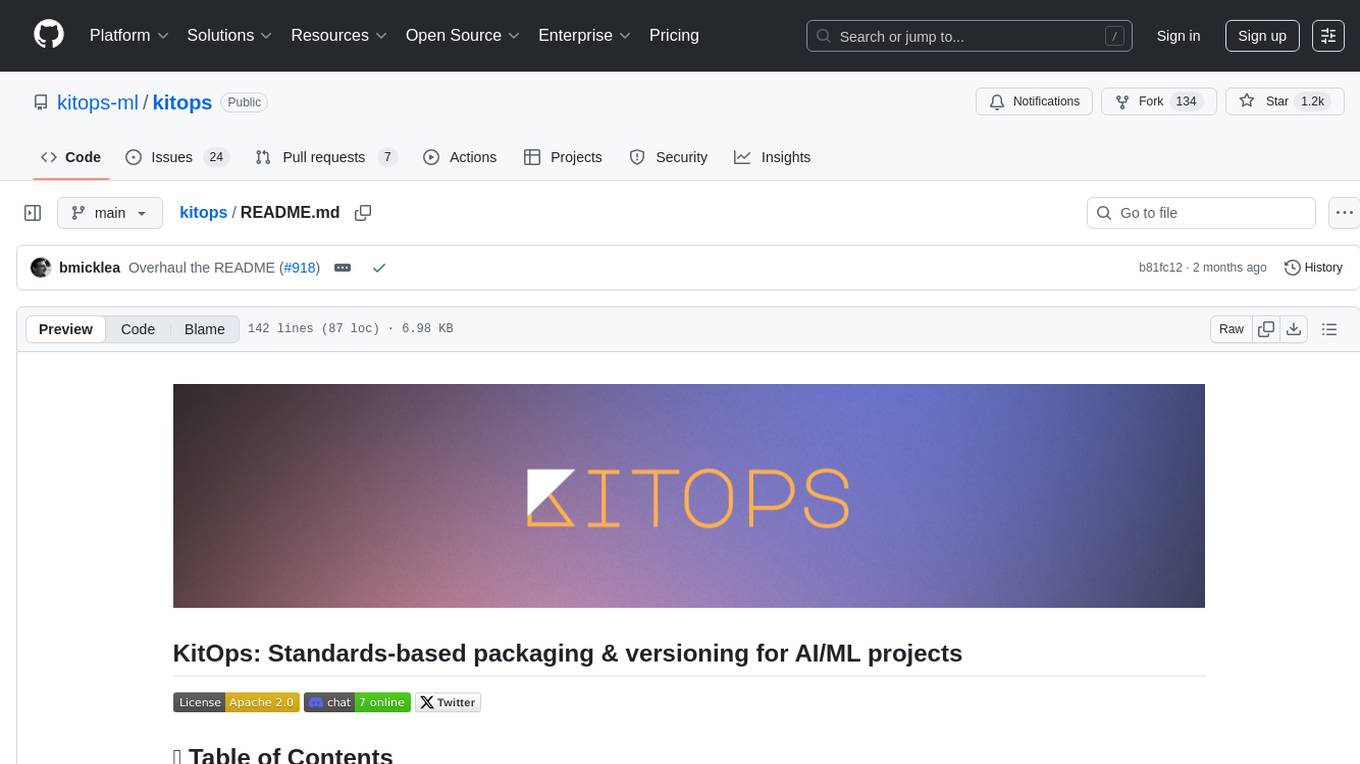
kitops
KitOps is a CNCF open standards project for packaging, versioning, and securely sharing AI/ML projects. It provides a unified solution for packaging, versioning, and managing assets in security-conscious enterprises, governments, and cloud operators. KitOps elevates AI artifacts to first-class, governed assets through ModelKits, which are tamper-proof, signable, and compatible with major container registries. The tool simplifies collaboration between data scientists, developers, and SREs, ensuring reliable and repeatable workflows for both development and operations. KitOps supports packaging for various types of models, including large language models, computer vision models, multi-modal models, predictive models, and audio models. It also facilitates compliance with the EU AI Act by offering tamper-proof, signable, and auditable ModelKits.
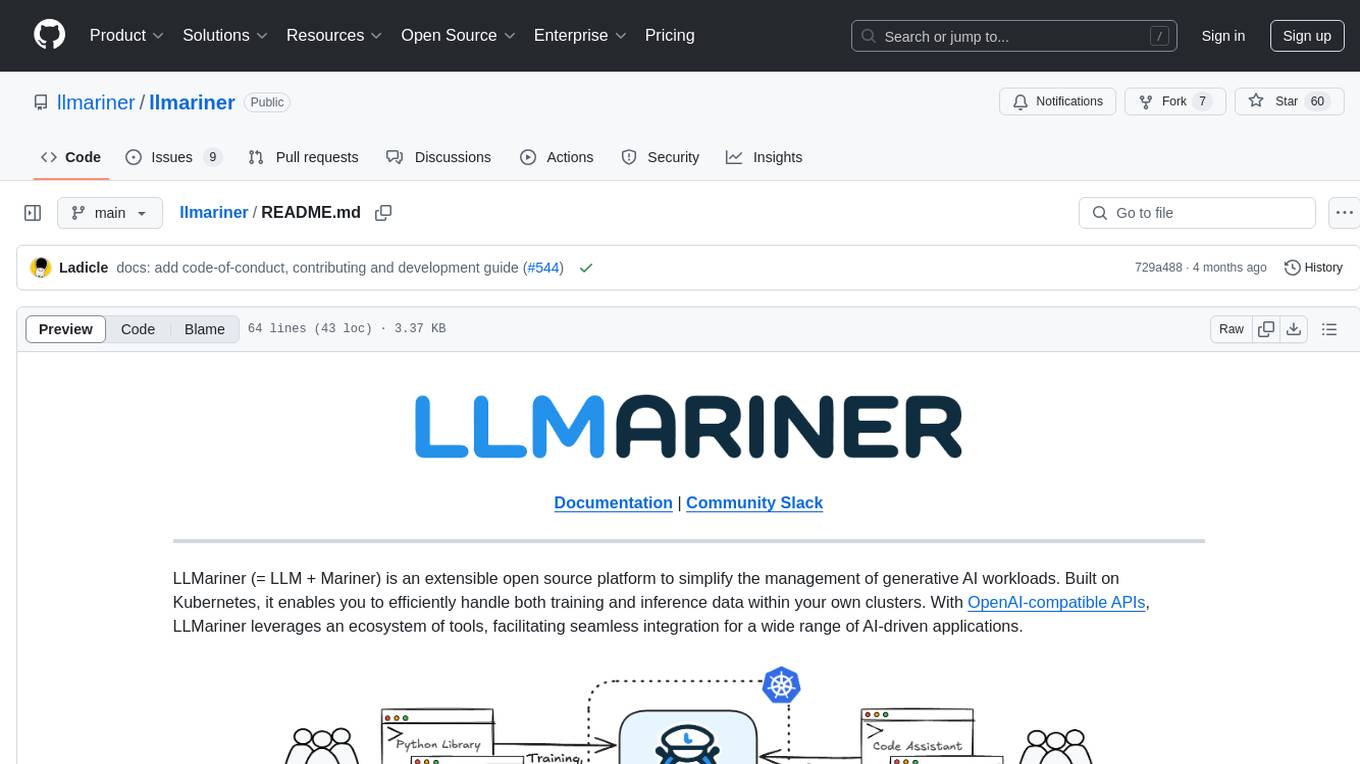
llmariner
LLMariner is an extensible open source platform built on Kubernetes to simplify the management of generative AI workloads. It enables efficient handling of training and inference data within clusters, with OpenAI-compatible APIs for seamless integration with a wide range of AI-driven applications.
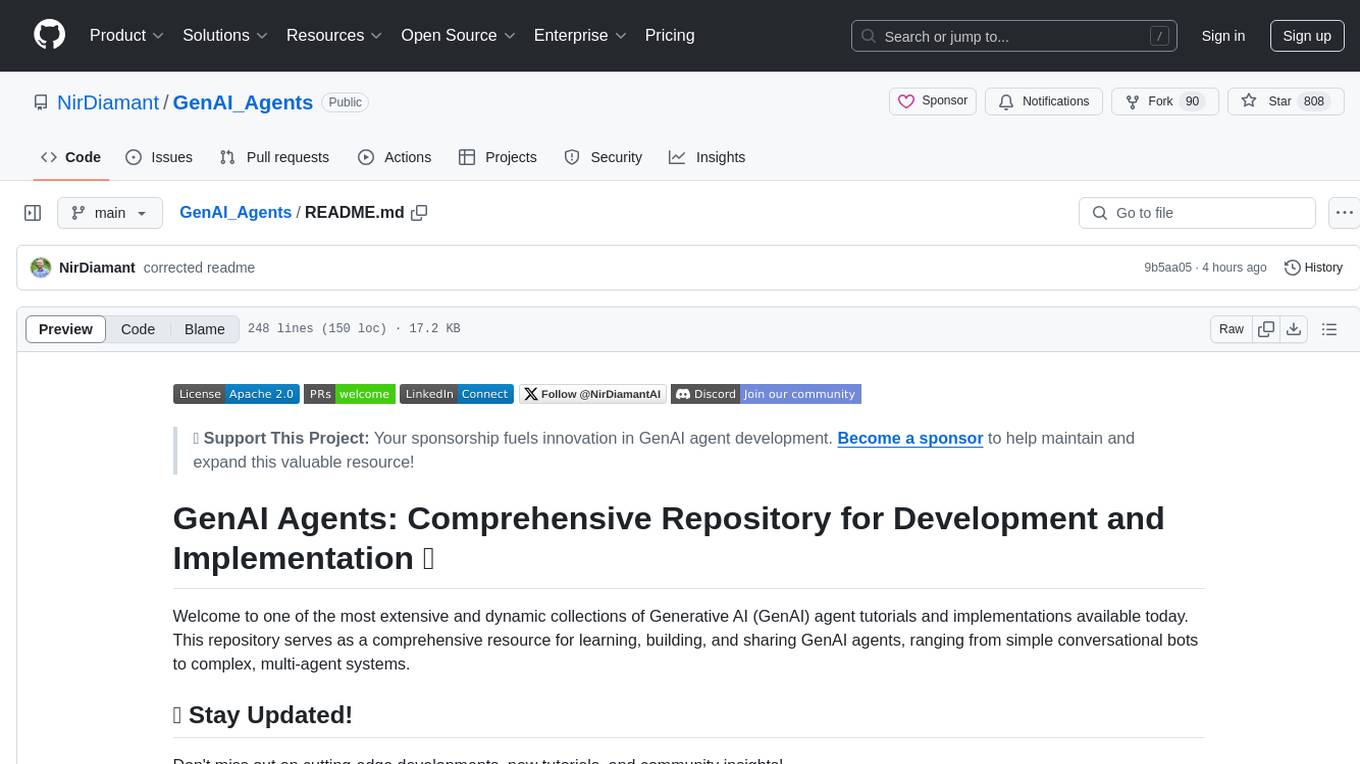
GenAI_Agents
GenAI Agents is a comprehensive repository for developing and implementing Generative AI (GenAI) agents, ranging from simple conversational bots to complex multi-agent systems. It serves as a valuable resource for learning, building, and sharing GenAI agents, offering tutorials, implementations, and a platform for showcasing innovative agent creations. The repository covers a wide range of agent architectures and applications, providing step-by-step tutorials, ready-to-use implementations, and regular updates on advancements in GenAI technology.
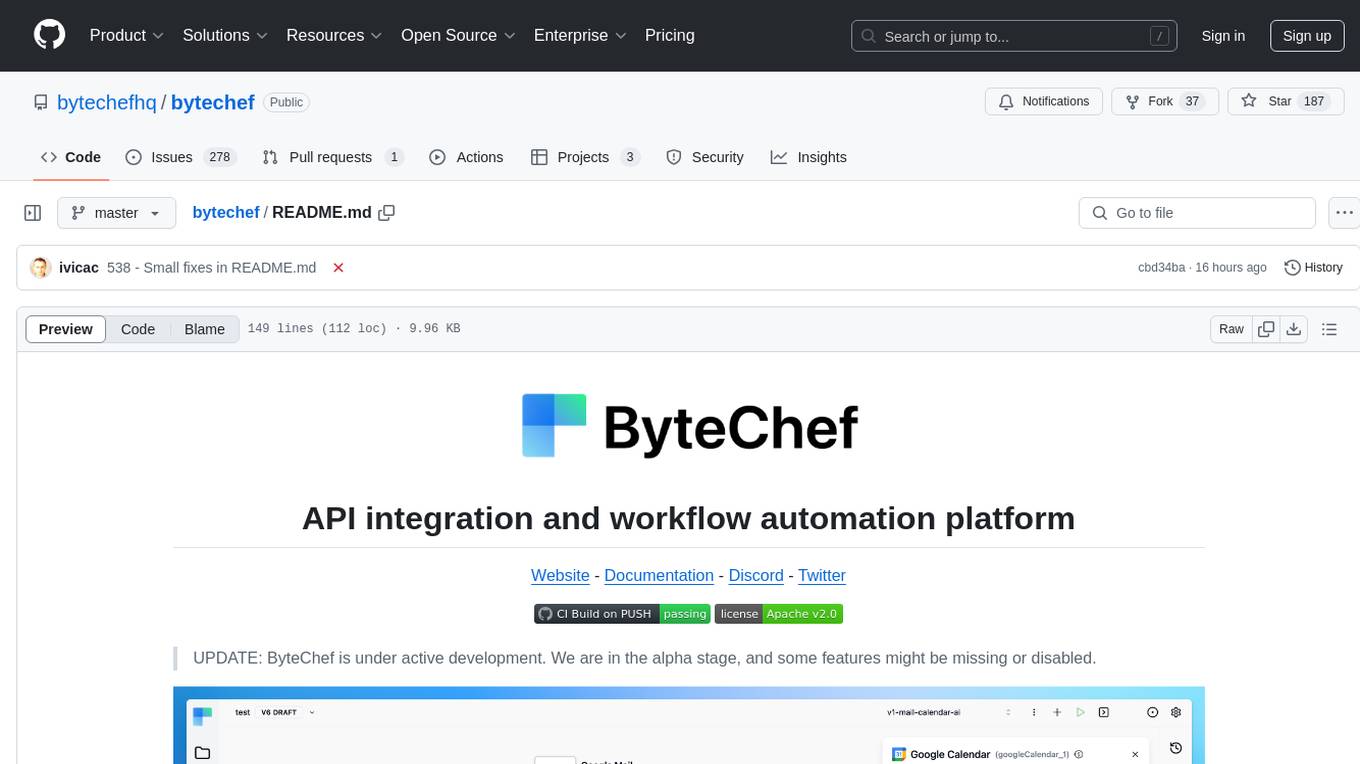
bytechef
ByteChef is an open-source, low-code, extendable API integration and workflow automation platform. It provides an intuitive UI Workflow Editor, event-driven & scheduled workflows, multiple flow controls, built-in code editor supporting Java, JavaScript, Python, and Ruby, rich component ecosystem, extendable with custom connectors, AI-ready with built-in AI components, developer-ready to expose workflows as APIs, version control friendly, self-hosted, scalable, and resilient. It allows users to build and visualize workflows, automate tasks across SaaS apps, internal APIs, and databases, and handle millions of workflows with high availability and fault tolerance.
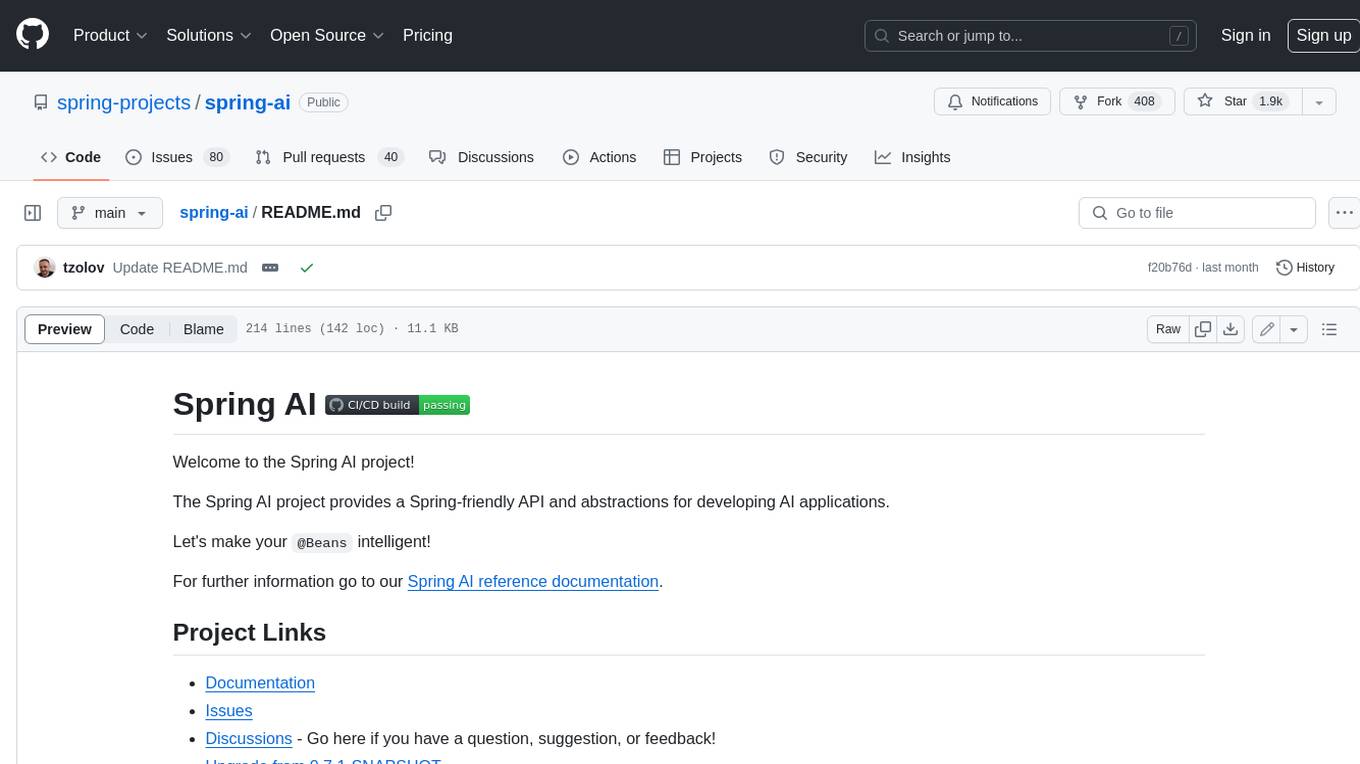
spring-ai
The Spring AI project provides a Spring-friendly API and abstractions for developing AI applications. It offers a portable client API for interacting with generative AI models, enabling developers to easily swap out implementations and access various models like OpenAI, Azure OpenAI, and HuggingFace. Spring AI also supports prompt engineering, providing classes and interfaces for creating and parsing prompts, as well as incorporating proprietary data into generative AI without retraining the model. This is achieved through Retrieval Augmented Generation (RAG), which involves extracting, transforming, and loading data into a vector database for use by AI models. Spring AI's VectorStore abstraction allows for seamless transitions between different vector database implementations.

genkit
Firebase Genkit (beta) is a framework with powerful tooling to help app developers build, test, deploy, and monitor AI-powered features with confidence. Genkit is cloud optimized and code-centric, integrating with many services that have free tiers to get started. It provides unified API for generation, context-aware AI features, evaluation of AI workflow, extensibility with plugins, easy deployment to Firebase or Google Cloud, observability and monitoring with OpenTelemetry, and a developer UI for prototyping and testing AI features locally. Genkit works seamlessly with Firebase or Google Cloud projects through official plugins and templates.
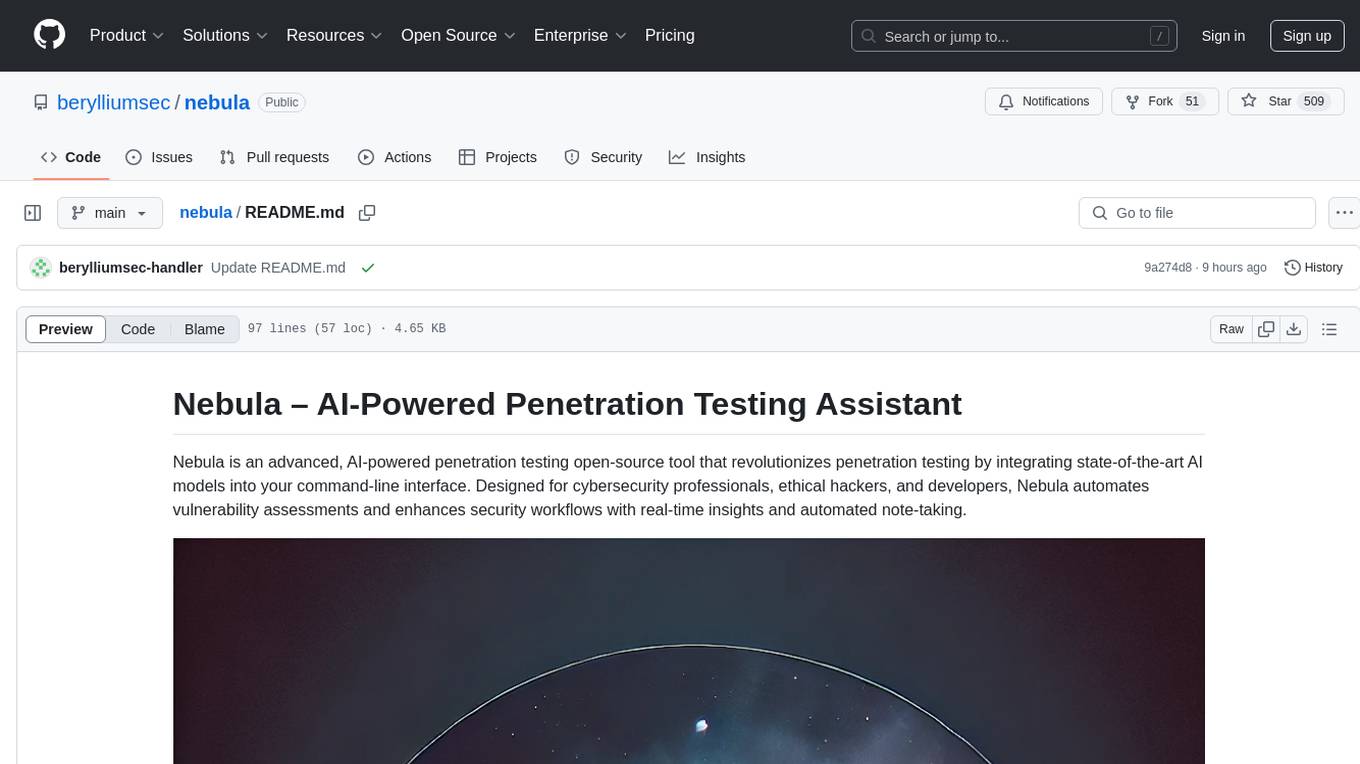
nebula
Nebula is an advanced, AI-powered penetration testing tool designed for cybersecurity professionals, ethical hackers, and developers. It integrates state-of-the-art AI models into the command-line interface, automating vulnerability assessments and enhancing security workflows with real-time insights and automated note-taking. Nebula revolutionizes penetration testing by providing AI-driven insights, enhanced tool integration, AI-assisted note-taking, and manual note-taking features. It also supports any tool that can be invoked from the CLI, making it a versatile and powerful tool for cybersecurity tasks.
For similar tasks
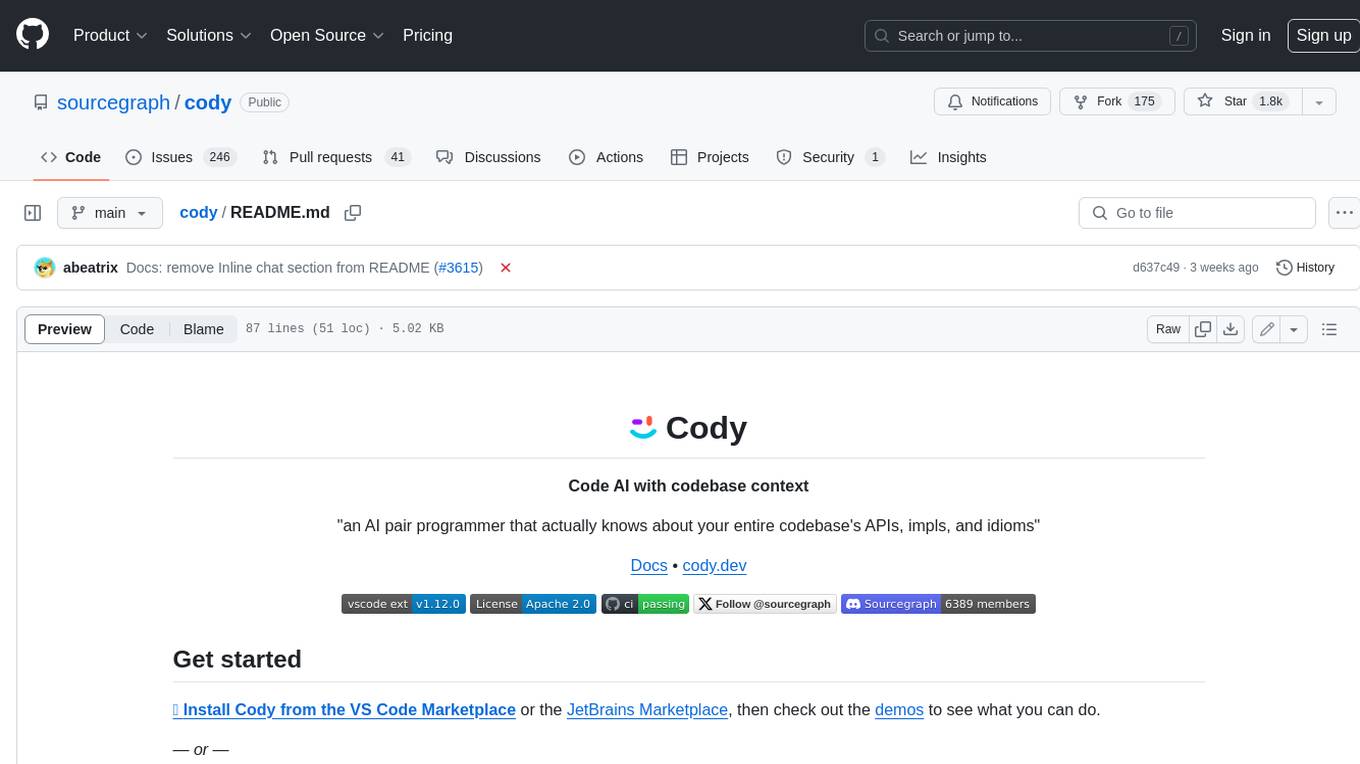
cody
Cody is a free, open-source AI coding assistant that can write and fix code, provide AI-generated autocomplete, and answer your coding questions. Cody fetches relevant code context from across your entire codebase to write better code that uses more of your codebase's APIs, impls, and idioms, with less hallucination.

twinny
Twinny is a free and private AI extension for Visual Studio Code that offers AI-based code completion and code discussion features. It provides real-time code suggestions, function explanations, test generation, refactoring requests, and more. Twinny operates both online and offline, supports customizable API endpoints, conforms to OpenAI API standards, and offers various customization options for prompt templates, API providers, model names, and more. It is compatible with multiple APIs and allows users to accept code solutions directly in the editor, create new documents from code blocks, and copy generated code solution blocks. Twinny is open-source under the MIT license and welcomes contributions from the community.
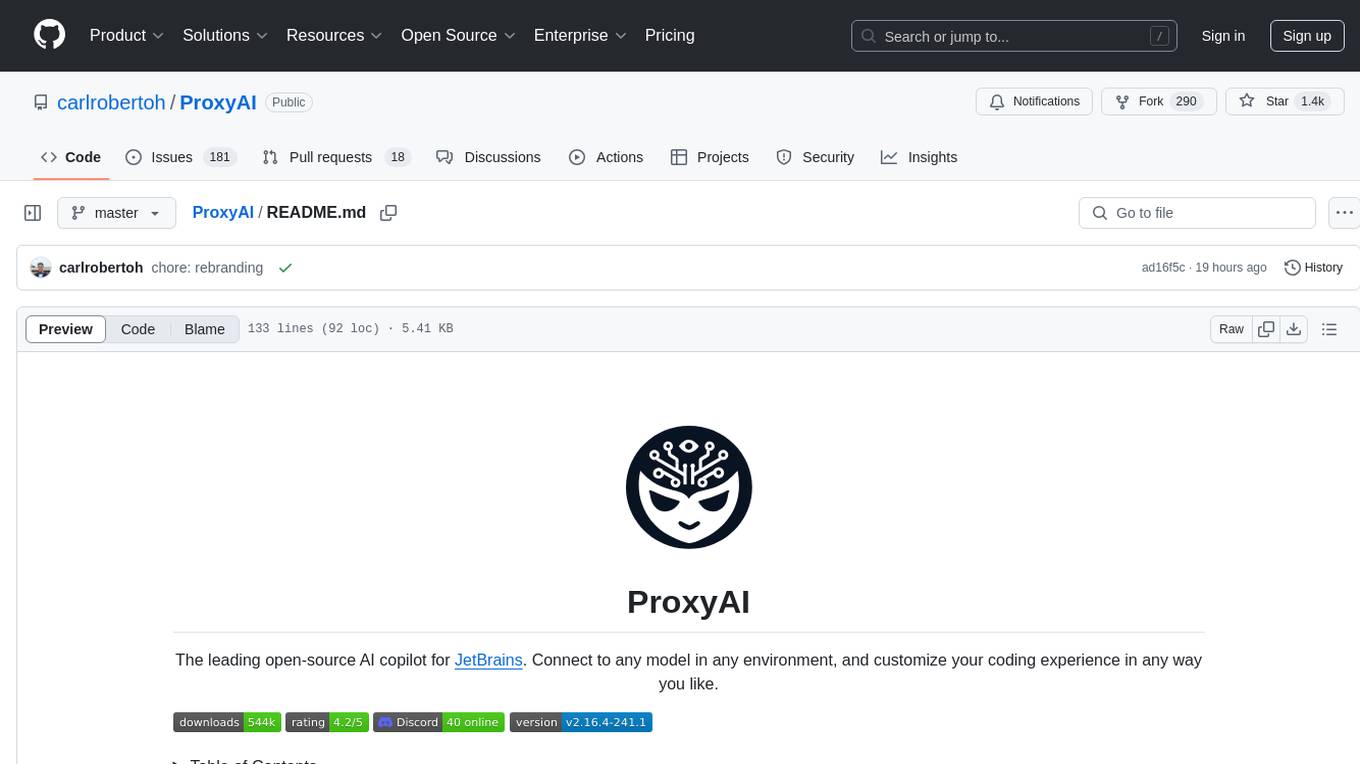
ProxyAI
ProxyAI is an open-source AI copilot for JetBrains, offering advanced code assistance features powered by top-tier language models. Users can customize their coding experience, receive AI-suggested code changes, autocomplete suggestions, and context-aware naming suggestions. The tool also allows users to chat with images, reference project files and folders, web docs, git history, and search the web. ProxyAI prioritizes user privacy by not collecting sensitive information and only gathering anonymous usage data with consent.
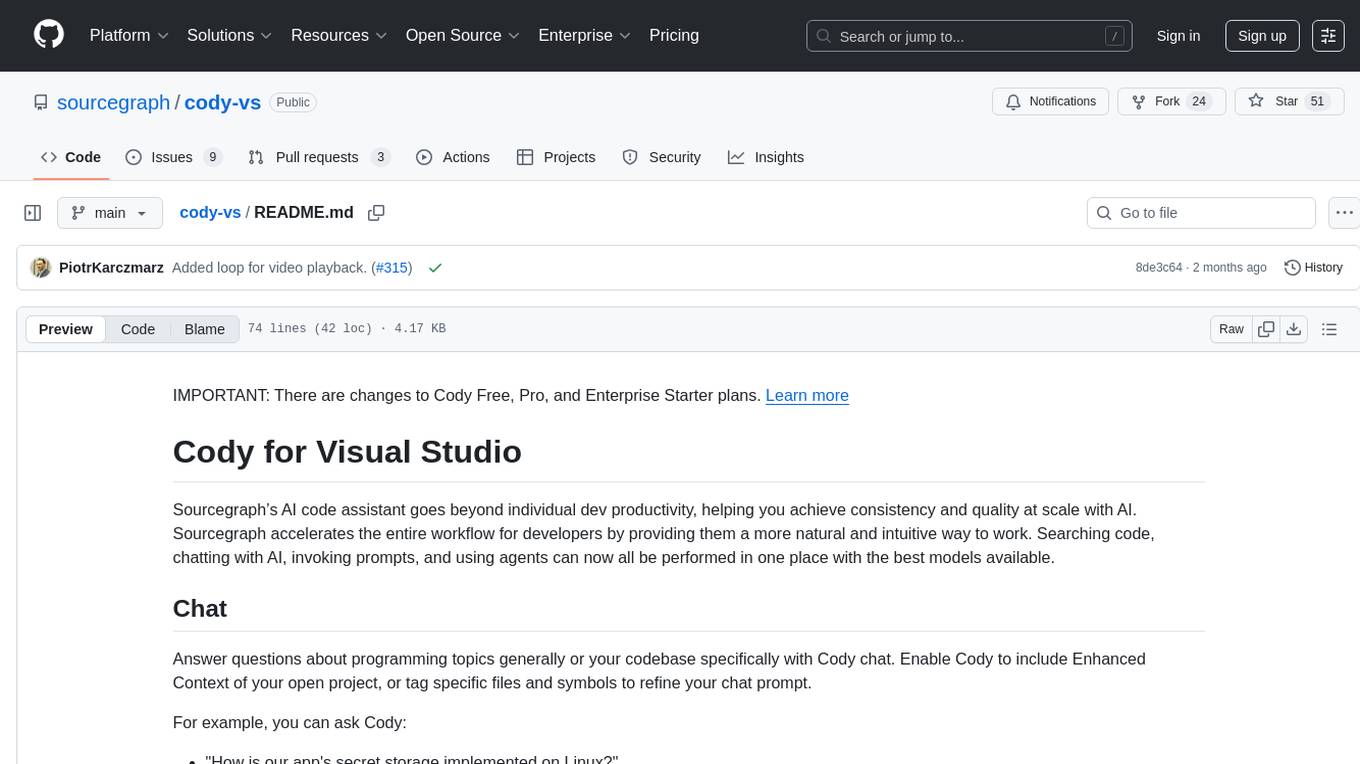
cody-vs
Sourcegraph’s AI code assistant, Cody for Visual Studio, enhances developer productivity by providing a natural and intuitive way to work. It offers features like chat, auto-edit, prompts, and works with various IDEs. Cody focuses on team productivity, offering whole codebase context and shared prompts for consistency. Users can choose from different LLM models like Claude, Gemini Pro, and OpenAI's GPT. Engineered for enterprise use, Cody supports flexible deployment and enterprise security. Suitable for any programming language, Cody excels with Python, Go, JavaScript, and TypeScript code.
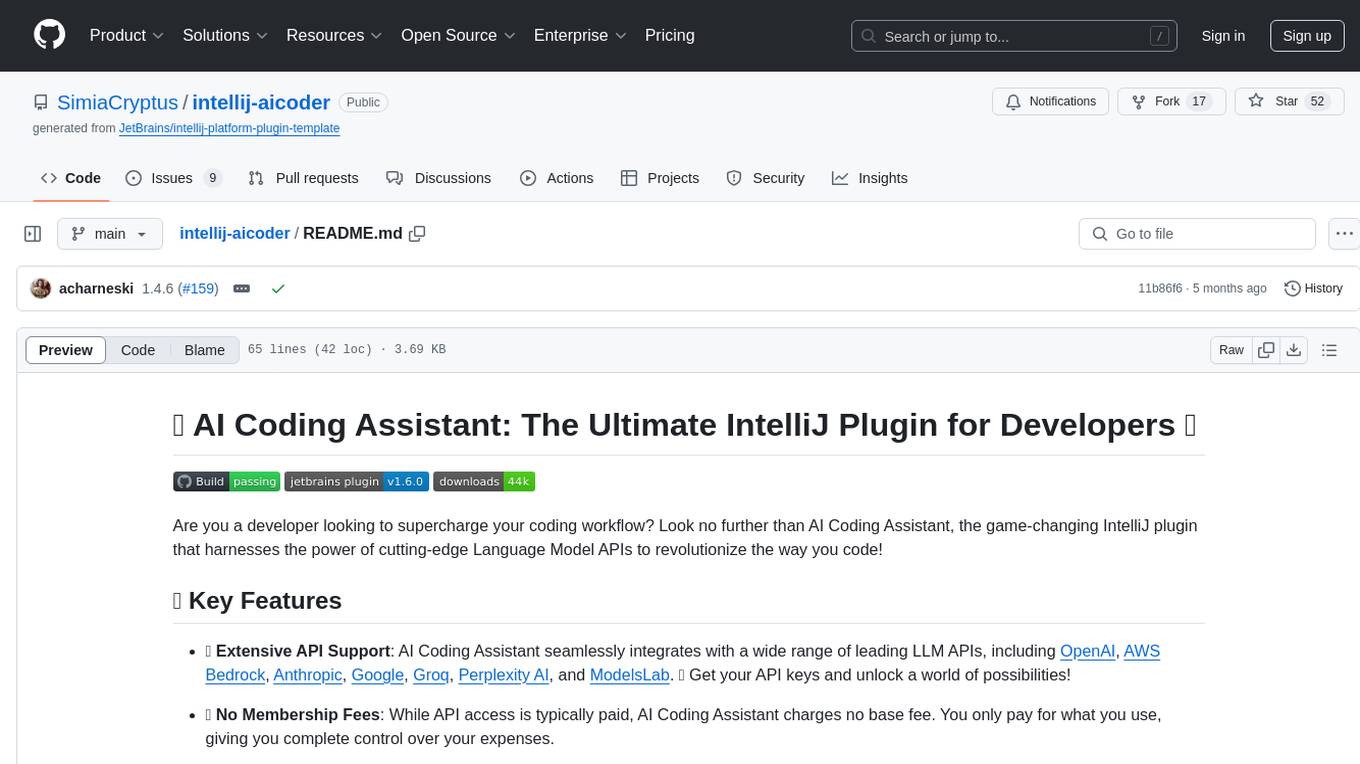
intellij-aicoder
AI Coding Assistant is a free and open-source IntelliJ plugin that leverages cutting-edge Language Model APIs to enhance developers' coding experience. It seamlessly integrates with various leading LLM APIs, offers an intuitive toolbar UI, and allows granular control over API requests. With features like Code & Patch Chat, Planning with AI Agents, Markdown visualization, and versatile text processing capabilities, this tool aims to streamline coding workflows and boost productivity.

twinny
Twinny is a free and open-source AI code completion plugin for Visual Studio Code and compatible editors. It integrates with various tools and frameworks, including Ollama, llama.cpp, oobabooga/text-generation-webui, LM Studio, LiteLLM, and Open WebUI. Twinny offers features such as fill-in-the-middle code completion, chat with AI about your code, customizable API endpoints, and support for single or multiline fill-in-middle completions. It is easy to install via the Visual Studio Code extensions marketplace and provides a range of customization options. Twinny supports both online and offline operation and conforms to the OpenAI API standard.
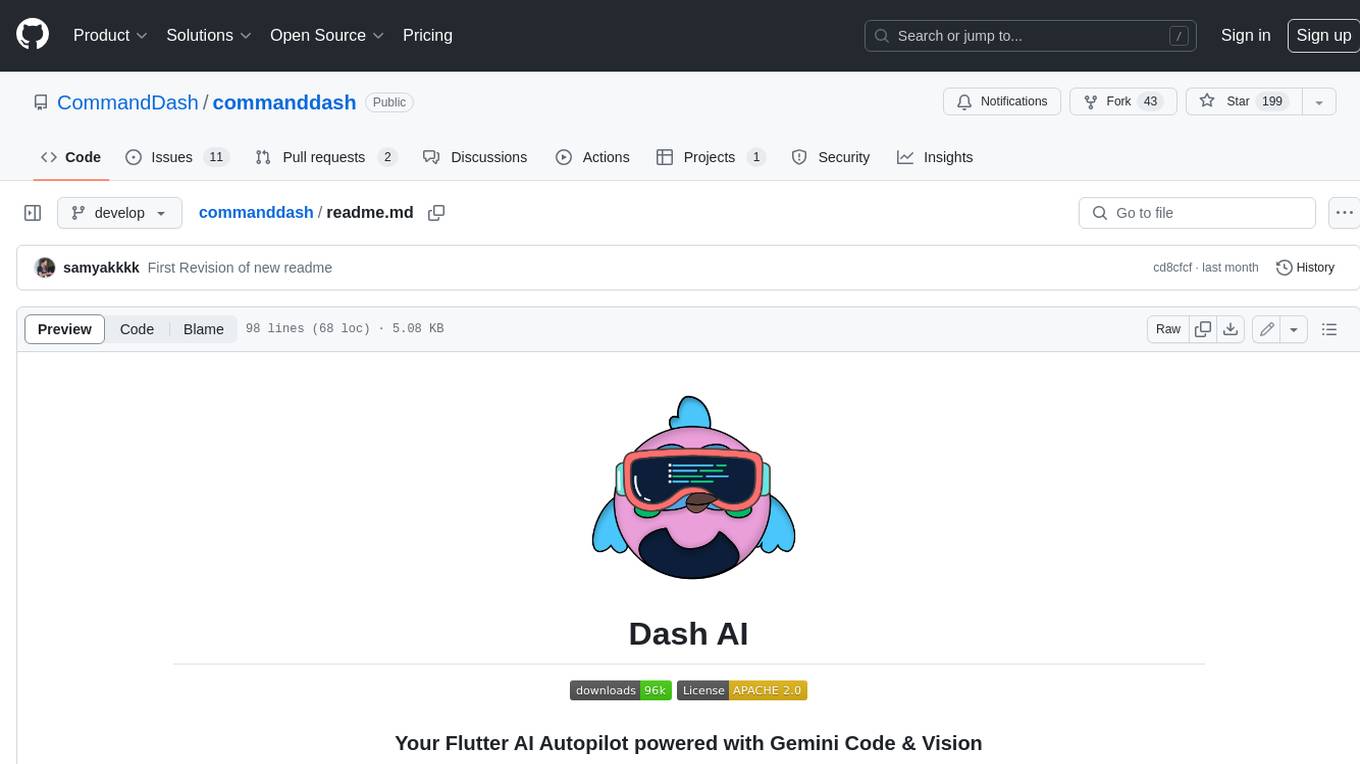
commanddash
Dash AI is an open-source coding assistant for Flutter developers. It is designed to not only write code but also run and debug it, allowing it to assist beyond code completion and automate routine tasks. Dash AI is powered by Gemini, integrated with the Dart Analyzer, and specifically tailored for Flutter engineers. The vision for Dash AI is to create a single-command assistant that can automate tedious development tasks, enabling developers to focus on creativity and innovation. It aims to assist with the entire process of engineering a feature for an app, from breaking down the task into steps to generating exploratory tests and iterating on the code until the feature is complete. To achieve this vision, Dash AI is working on providing LLMs with the same access and information that human developers have, including full contextual knowledge, the latest syntax and dependencies data, and the ability to write, run, and debug code. Dash AI welcomes contributions from the community, including feature requests, issue fixes, and participation in discussions. The project is committed to building a coding assistant that empowers all Flutter developers.
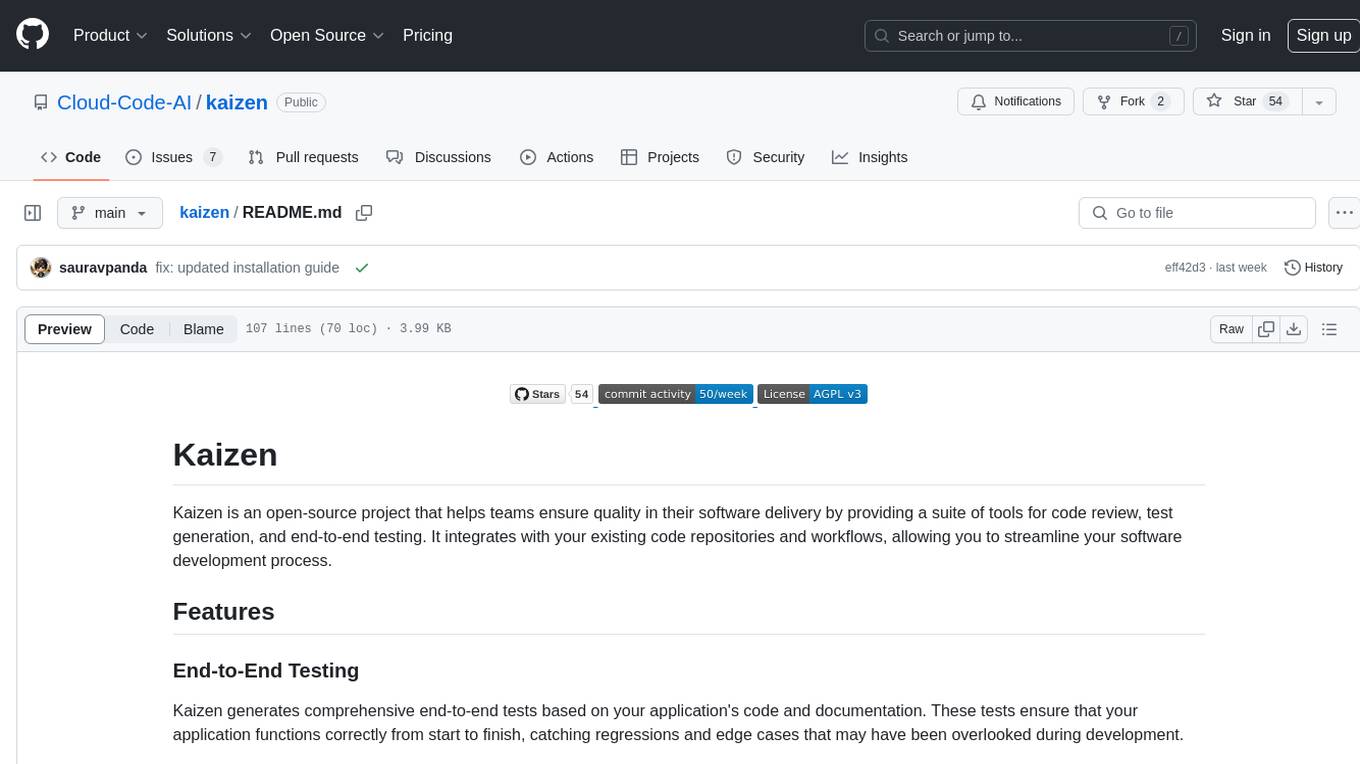
kaizen
Kaizen is an open-source project that helps teams ensure quality in their software delivery by providing a suite of tools for code review, test generation, and end-to-end testing. It integrates with your existing code repositories and workflows, allowing you to streamline your software development process. Kaizen generates comprehensive end-to-end tests, provides UI testing and review, and automates code review with insightful feedback. The file structure includes components for API server, logic, actors, generators, LLM integrations, documentation, and sample code. Getting started involves installing the Kaizen package, generating tests for websites, and executing tests. The tool also runs an API server for GitHub App actions. Contributions are welcome under the AGPL License.
For similar jobs

sweep
Sweep is an AI junior developer that turns bugs and feature requests into code changes. It automatically handles developer experience improvements like adding type hints and improving test coverage.

teams-ai
The Teams AI Library is a software development kit (SDK) that helps developers create bots that can interact with Teams and Microsoft 365 applications. It is built on top of the Bot Framework SDK and simplifies the process of developing bots that interact with Teams' artificial intelligence capabilities. The SDK is available for JavaScript/TypeScript, .NET, and Python.

ai-guide
This guide is dedicated to Large Language Models (LLMs) that you can run on your home computer. It assumes your PC is a lower-end, non-gaming setup.

classifai
Supercharge WordPress Content Workflows and Engagement with Artificial Intelligence. Tap into leading cloud-based services like OpenAI, Microsoft Azure AI, Google Gemini and IBM Watson to augment your WordPress-powered websites. Publish content faster while improving SEO performance and increasing audience engagement. ClassifAI integrates Artificial Intelligence and Machine Learning technologies to lighten your workload and eliminate tedious tasks, giving you more time to create original content that matters.

chatbot-ui
Chatbot UI is an open-source AI chat app that allows users to create and deploy their own AI chatbots. It is easy to use and can be customized to fit any need. Chatbot UI is perfect for businesses, developers, and anyone who wants to create a chatbot.

BricksLLM
BricksLLM is a cloud native AI gateway written in Go. Currently, it provides native support for OpenAI, Anthropic, Azure OpenAI and vLLM. BricksLLM aims to provide enterprise level infrastructure that can power any LLM production use cases. Here are some use cases for BricksLLM: * Set LLM usage limits for users on different pricing tiers * Track LLM usage on a per user and per organization basis * Block or redact requests containing PIIs * Improve LLM reliability with failovers, retries and caching * Distribute API keys with rate limits and cost limits for internal development/production use cases * Distribute API keys with rate limits and cost limits for students

uAgents
uAgents is a Python library developed by Fetch.ai that allows for the creation of autonomous AI agents. These agents can perform various tasks on a schedule or take action on various events. uAgents are easy to create and manage, and they are connected to a fast-growing network of other uAgents. They are also secure, with cryptographically secured messages and wallets.

griptape
Griptape is a modular Python framework for building AI-powered applications that securely connect to your enterprise data and APIs. It offers developers the ability to maintain control and flexibility at every step. Griptape's core components include Structures (Agents, Pipelines, and Workflows), Tasks, Tools, Memory (Conversation Memory, Task Memory, and Meta Memory), Drivers (Prompt and Embedding Drivers, Vector Store Drivers, Image Generation Drivers, Image Query Drivers, SQL Drivers, Web Scraper Drivers, and Conversation Memory Drivers), Engines (Query Engines, Extraction Engines, Summary Engines, Image Generation Engines, and Image Query Engines), and additional components (Rulesets, Loaders, Artifacts, Chunkers, and Tokenizers). Griptape enables developers to create AI-powered applications with ease and efficiency.